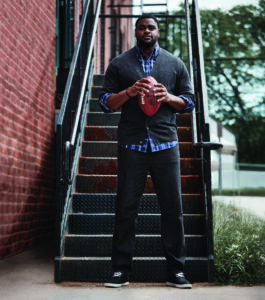Ujjwal Dhoot, Destination XL Group Inc.’s chief marketing officer describes 2020 as a year of change and forced experimentation.
“It was a tough year for a lot of retailers,” Dhoot says. “At this time last year, all of our stores were closed for several months and that forced us to be completely reliant on our ecommerce sales.”
The plus-size men’s apparel merchant quickly pivoted during the pandemic to ensure its website at DXL.com prominently showcased its casual clothing, such as denim, knits, shorts and athleisure. DXL.com still offered its more formal apparel, just less of it. The retailer also was able to reduce its contracted inventory with manufacturers and brands by tens of millions of dollars in 2020, Dhoot says. This way it was not stuck with its usual product supply to try and sell it to shoppers who didn’t as much of it that year. It also started selling masks.

Ujjwal Dhoot, Destination XL Group Inc.’s chief marketing officer
“There was a pretty big shift in lifestyle and that created a change in the clothing needs of our guests,” Dhoot says. “Just like the rest of the world, [our customers] were not going anywhere. They were not going to events, not traveling, not getting together with friends, not going to bars and restaurants. They were not dressing up for any occasion.”
When its stores were closed for all of Q2 through mid-Q3, DXL was forced to rely entirely on its website for sales. DXL.com’s tweak to its merchandising paid off, as its online sales surged 37% year over year in 2020 and ecommerce represented 41% of its sales in 2020, up from the low 20% range in 2019, Dhoot says. Total sales for 2020, however, decreased roughly 33% year over year.
Once its stores did reopen, DXL made the necessary adjustments to ensure safety for shoppers and staff, such as practicing social distancing and conducting more thorough cleaning. It also quickly launched curbside pickup.
Stores are account for the majority of its sales, and the retailer plans to continue driving shoppers to its physical locations. For example, DXL periodically offers an incentive, such as $10 off an order of $50, for shoppers to order online and pick up in store. Shoppers who do BOPIS often make additional purchases when they come into the store to pick up their order, Dhoot says without providing more details.

DXL.com promotes BOPIS as “better than free shipping.”
As consumer behavior shifts back to normal, DXL expects some pandemic habits and trends to hold. For example, the retailer plans to keep its merchandising mix roughly the same as the past year. Even though shoppers will probably start to purchase more formalwear, DXL knows more consumers will likely be working from home in and will gravitate towards more casual clothing.
For 2021, Dhoot expects ecommerce’s portion of online sales to taper but not fall back to pre-pandemic levels. In the long term, the brand forecasts online sales will account for at least 35% of total sales and will continue to grow “materially faster” than store sales, he says.
DXL tackles unauthorized ads on its website
DXL was able to lift its 2020 web sales thanks, in part, to its earlier implementation of a conversion-lifting software.
In 2019, DXL’s customer service team continually received inquiries from shoppers who said they had clicked on product recommendations on DXL.com only to be directed to another website to purchase the products. These shoppers wanted to know why they were no longer purchasing on DXL.com. From previous experience at other brands, Dhoot knew that shoppers were clicking on malicious ads injected onto its website, rather than a DXL product recommendation.

DLX.com pivots to more casual clothing.
This problem occurs when a consumer unknowingly downloads an unauthorized ad injector malware that is bundled with a free software she did want, such as antivirus software, a coupon browser extension or a file converter. The ad injection malware then places ads on ecommerce site that link to a competitor’s website.
DXL piloted software from Namogoo Technologies Ltd. to fix the issue. Namogoo provides retailers with a line of code they place on their ecommerce sites. When a shopper’s browser pings the server for the retailer’s web page, the code will evaluate if the browser has the ad injection malware. If it does, Namogoo’s code blocks the unauthorized ads from displaying on the website.
The A-B pilot test revealed that 21% of DXL.com’s site visitors had the malware. While not all of those consumers were clicking on the unauthorized ads and thus leaving DXL.com to visit another merchant’s website, a portion of them were. In a 30-day test in which half of the browser-infected shoppers saw the ads, and the other half did not, DXL.com’s conversion rate increased 8.9% for the group that did not see the ads.
Dhoot says he was surprised by the the conversion lift, as he was expecting a 2-3% lift. With a clear ROI, DXL implemented the software. It was a quick integration, Dhoot says, only taking a few weeks. Dhoot and Namogoo declined to reveal costs.
Dhoot says he’s especially glad DXL fixed the issue before the pandemic, so the retailer could capture more online sales during a time when the web was the retailer’s only source of revenue.
“It’s important, as digital is a bigger part of the business,” Dhoot says.
Destination XL is No. 464 in the 2021 Digital Commerce 360 Top 1000.
Favorite